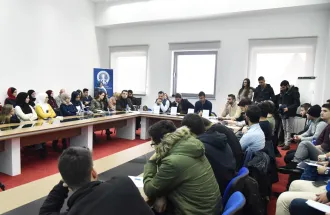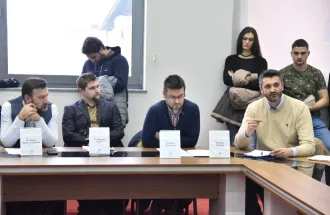On Wednesday, January 9, 2019, the round table "Aggression, Not a Civil War: the Character of War in BiH 1992-1995" was held at the International University of Sarajevo (IUS). It was organized by Balkan Studies Center and the IUS Political Science program.
The conference room was filled with the audience interested in the topic, and the speakers at this round table were: Dr. Admir Mulasomanović (International University of Sarajevo), Dr. Enis Omerović (University of Zenica), Dr. Emir Suljagić (International University of Sarajevo), and Hikmet Karčić (Institute for Islamic Tradition of Bosniaks).
They spoke about the political, historical, legal and financial aspects of the 1992-1995 war in Bosnia and Herzegovina, and presented research, legal and financial evidence supporting the claim that this war was not a civil war, but an aggression against Bosnia and Herzegovina.
Dean of the IUS Faculty of Arts and Social Sciences and Balkan Studies Center coordinator Prof. Dr. Admir Mulaosmanović stated: "It is important to emphasize that the split of Yugoslavia was preceded by the destruction of political relations within it, and the establishment of parallel structures during the second half of the 1980s. In such a situation, BiH has been brought to almost complete dysfunctionality, with the aim to make it an easier prey, in the first place to Great Serbia and then in Greater Croatia concepts. It is sad that the firmly established and hard facts about the aggressive campaigns against our country have to be repeated over and over again. But, regardless of such a situation, it is nevertheless good to have intellectuals and academics who are aware that it is necessary to educate on this topic.”
Dr. Enis Omerović said: ”The International Court of Justice (ICJ) determined there was much evidence of direct or indirect participation by the official army of the Federal Republic of Yugoslavia (FRY), along with the Vojska Republike Srpske (VRS), in military operations in BiH that was condemned by the political organs of the UN which demanded that the FRY put an end to it. However, an international body who specifically determined the legal character of an armed conflict in BiH was the International Criminal Tribunal for the former Yugoslavia (ICTY), which concluded in its court rulings, starting with the case of Duško Tadić, that the armed conflict on the territory of BiH was international. The ICTY has established the context of conflict in BiH, the causes, the goals. These legal facts are of a great significance for the sake of the future, for lives of future generations in the Balkans, for the process of dealing with the past.”
During the session students and other guests asked questions, and the date of the session symbolically speaks of different historical interpretations and narratives of the same events that happened in our region.














